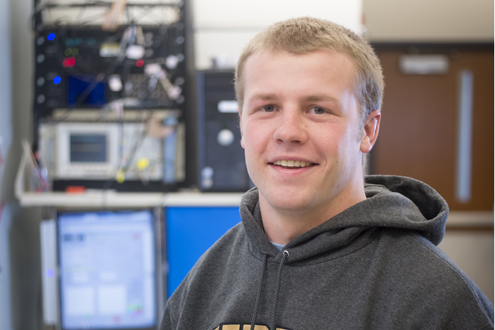Undergraduate Gets "True Taste" of Research Thanks to Grubbs Fellowship
Youngs was a 2013 recipient of the David and Stephen Grubbs Fellowship for Summer Undergraduate Research. The fellowship enables students to live on campus over the summer and participate in research under the tutelage of a faculty member. It is designed to give students a close look at a career in research at a very early stage in their academic tenure, an experience that is being fostered in greater numbers than ever at the Weldon School.
Youngs worked with Kevin Otto, an associate professor of biomedical engineering, on a developing technology that will aid patients with sensory loss. The technology might be used to provide visual feedback to the sight-impaired, for example. It could provide audio feedback for the hearing impaired or deaf patient if cochlear implants are not sufficient. “Perhaps the most clinically relevant application is for paralyzed or amputee patients,” Youngs said. “Cortical recordings enable patients to control robotic systems independently, such as a wheelchair or robotic arm. Cortical stimulation then provides the necessary feedback for these systems to become natural for the user.” For example, in the case of a robotic arm, users could feel the glass of water they are picking up to know how hard they are squeezing rather than relying on visual cues, which may make the process clumsy.
Youngs worked on determining the discriminability of various parameters through intracortical microstimulation. He performed behavioral stimulation experiments and helped refine the experimental design as the preliminary data emerged. “In the lab we are able to create artificial precepts--sounds, more specifically tones, and feelings, possibly vibrations or fluttering sensations--through electrical excitation of areas in the brain. The goal for the work last summer was to gain a better understanding of how much we need to change aspects of the stimulation--for example, amplitude, frequency, or location in the brain--for there to be a perceived difference to the subject.”
The summer research experience left a lasting impact on Youngs. “It's difficult to know if research is a career choice for you without completely delving into it,” Youngs said. “Even working in a lab during the semester doesn't tell you nearly as much as devoting an entire summer to the work. The summer was a huge learning experience for me. I was able to work as autonomously as I wanted, while creating a close relationship with my graduate student and faculty advisers. It gave me a true taste of how research is performed and how truly new discoveries are made.”
The Grubbs fellowship was established by brothers Stephen and David Grubbs in hopes of inspiring undergraduate students to explore possible career choices in biomedical engineering. Both brothers had summer research experiences while undergraduates at Purdue that left indelible impressions upon them. For more information on the Grubbs brothers and their inspirational story, read an Imprints article from 2010.
“I think that summer experiences are critical to an undergraduate education,” Youngs added. “All of the skills and knowledge gained in the classroom become useless without the ability to apply them to real life scenarios. These opportunities also allow you to challenge yourself with something new outside of your comfort zone where you are able to really grow as a person.”


